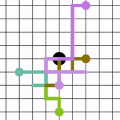The simple random walk on $\mathbb{Z}^p$ shows two drastically different behaviours depending on the value of $p$: it is recurrent when $p\in\{1,2\}$ while it escapes (with a rate increasing with $p$) as soon as $p\geq3$. This classical example illustrates that the asymptotic properties of a random walk provides some information on the structure of its state space. This paper aims to explore analogous questions on space made up of combinatorial objects with no algebraic structure. We take as a model for this problem the space of unordered unlabeled rooted trees endowed with Zhang edit distance. To this end, it defines the canonical unbiased random walk on the space of trees and provides an efficient algorithm to evaluate its escape rate. Compared to Zhang algorithm, it is incremental and computes the edit distance along the random walk approximately 100 times faster on trees of size $500$ on average. The escape rate of the random walk on trees is precisely estimated using intensive numerical simulations, out of reasonable reach without the incremental algorithm.
翻译:暂无翻译




